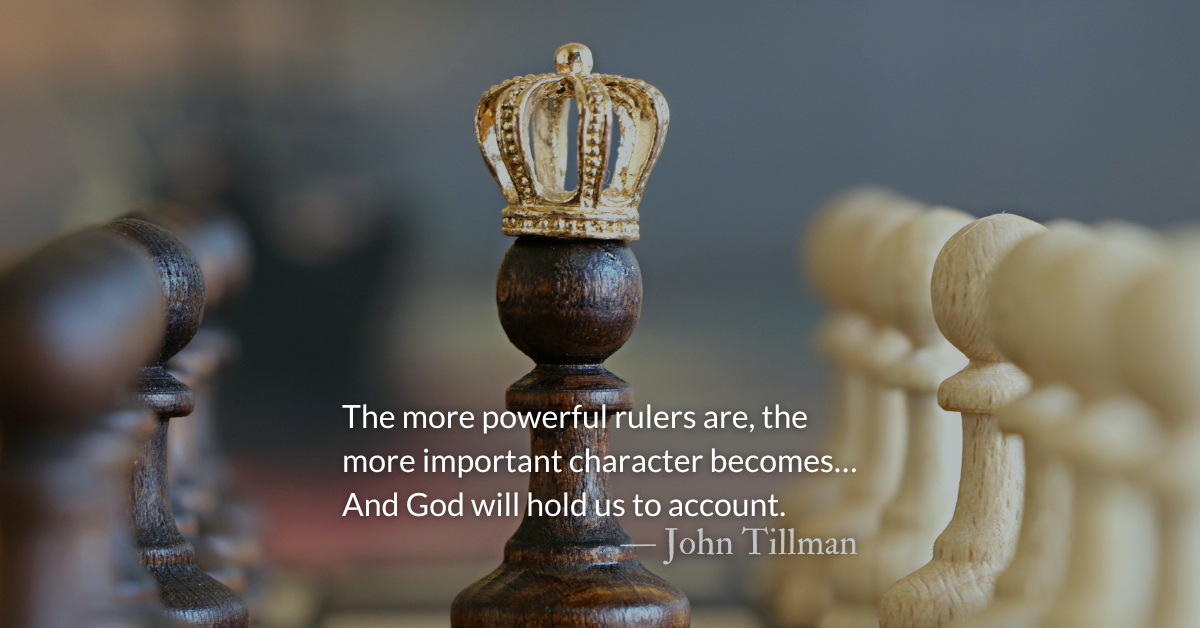Scripture Focus: 1 Kings 1.50-53
50 But Adonijah, in fear of Solomon, went and took hold of the horns of the altar. 51 Then Solomon was told, “Adonijah is afraid of King Solomon and is clinging to the horns of the altar. He says, ‘Let King Solomon swear to me today that he will not put his servant to death with the sword.’ ”
52 Solomon replied, “If he shows himself to be worthy, not a hair of his head will fall to the ground; but if evil is found in him, he will die.” 53 Then King Solomon sent men, and they brought him down from the altar. And Adonijah came and bowed down to King Solomon, and Solomon said, “Go to your home.”
Reflection: Who Is the True King?
By John Tillman
David is rightly remembered as the greatest of Israel’s kings. For generations, every good king will be described as following in David’s footsteps, and every bad king will be described as forsaking them. But David’s reign and personal life are far from perfect. The writers of the scrolls of Samuel, Kings, and Chronicles go out of their way to show us that even the “man after God’s own heart” fell short.
The cracks caused by David’s flaws showed early. David’s taking of multiple wives and concubines and his inability or unwillingness to deal justly with crimes and corruption within his family explode into bloodshed over and over.
At the end of David’s reign, Israel found itself with two would-be kings. Which one is lawful? Which one is the usurper? Did Adonijah know David planned to place Solomon on the throne? Did David forget? Did Bathsheba or Nathan deceive David, making him think he forgot a promise he never made? Palace intrigue and conspiracy theories are always interesting to us.
Adonijah’s three older brothers were dead. According to tradition, he was the rightful heir. The writer carefully points out David’s failure to correct Adonijah or warn him about his presumptions. Adonijah and his supporters may have taken this as David’s tacit approval.
Some have proposed that Nathan and Bathsheba plotted against Adonijah by manipulating poor, old, senile David. However, David doesn’t seem weak or senile in his response. In addition, Chronicles has a fuller account of David’s public declaration that Solomon would be the next king. This public knowledge makes it hard to see Adonijah as innocent.
The sins of a normal person harm the individual, friends, and family. But even the tiniest flaws in rulers are multiplied by their wealth, influence, and power—and they slay multitudes. The warning tremors of instability we see during David’s lifetime grew after his death. Solomon’s reign would end with a nation-splitting earthquake of a civil war that cost tens of thousands of lives.
More powerful rulers are more likely to do greater harm, even with good intentions.
There are no perfect rulers on Earth, but that doesn’t mean character is a poor political strategy or that victory outweighs virtue. As we select rulers, remember: The more powerful rulers are, the more important character becomes. And in a democracy, the true king is the voter. And God will hold us to account.
Divine Hours Prayer: The Greeting
Hosanna, Lord, hosanna!… Blessed is he who comes in the name of the Lord; we bless you from the house of the Lord — Psalm 118.25-26
– From The Divine Hours: Prayers for Summertime by Phyllis Tickle.
Today’s Readings
1 Kings 1 (Listen 7:52)
Psalms 18 (Listen 5:47)
This Weekend’s Readings
1 Kings 2 (Listen 7:45), Psalms 19 (Listen 1:52)
1 Kings 3 (Listen 4:29), Psalms 20-21 (Listen 2:37)
Read more about Limits of Human Grace
On his deathbed, David sounded hurt, petty, vindictive…David, left Solomon a mix of things, including a hit list.
Read more about Supporting Our Work
Our work needs your support. Ad-free content isn’t free to produce. Please consider becoming a donor.









